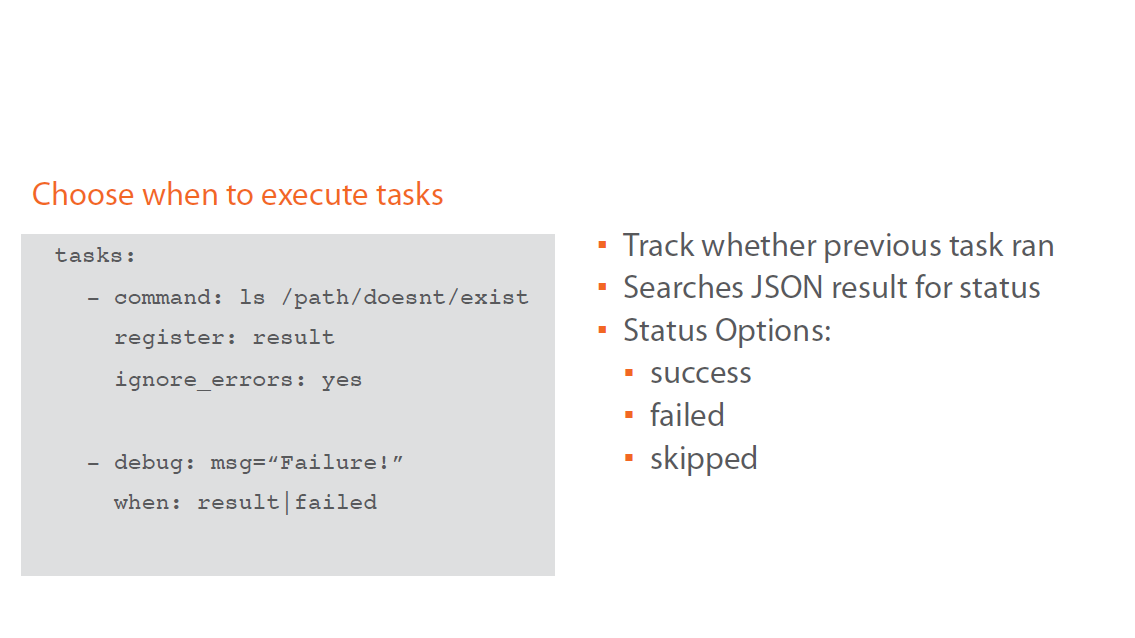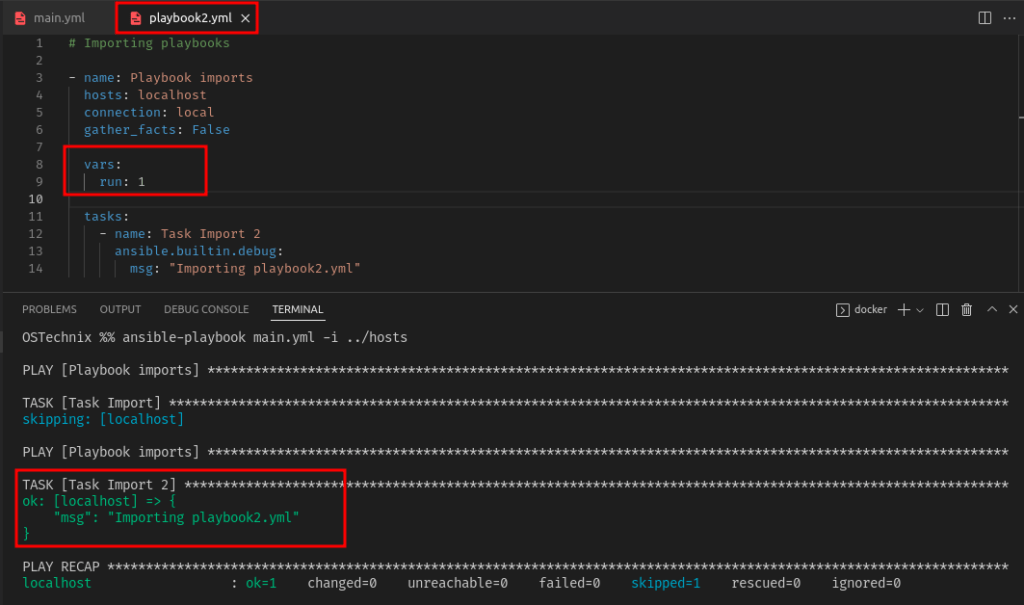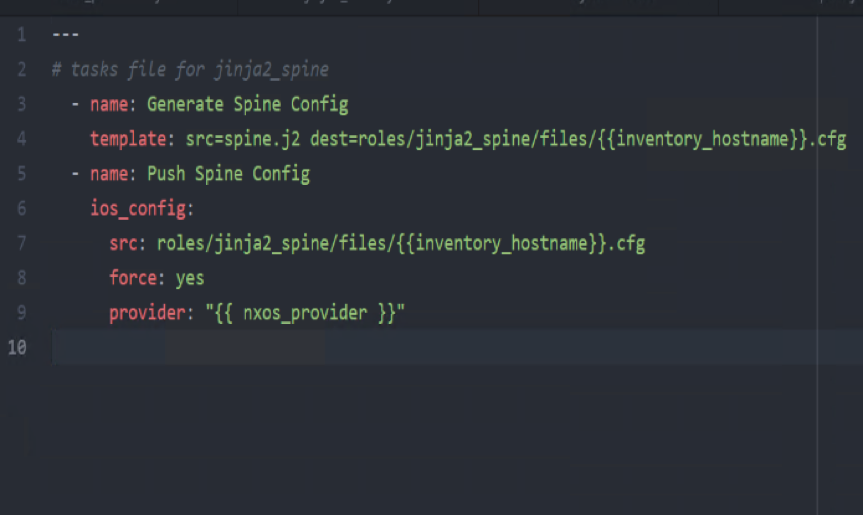Ansible Conditional Statements Should Not Include Jinja2 Templating
Ansible Conditional Statements Should Not Include Jinja2 Templating - { { item }} in group_names. Web ansible uses jinja for templates. Let’s take a closer look at how we can use it to render jack’s attribute json file and gain. Ansible_lvm.lvs.{{ resize_lvname }}.size_g <<strong> 10</strong>. You can use any method of a python object, indeed you're. Web ansible will look for jinja2 template files in your project directory or in a directory named templates under your project directory. {{ item.use_sudo}} == true after. Jinja is a fairly thin layer over python. Sorry, this post was deleted by the person who originally posted it. You can find more examples of supported conditionals at. Let’s take a closer look at how we can use it to render jack’s attribute json file and gain. Certpem.stat.lnk_target != /etc/letsencrypt/certificates/ { {. Web templating (jinja2) — ansible documentation. There are many options to control execution flow in ansible. For plain python cluster_name+'a' if iscondition is true else cluster_name +'b' wors great if the. Web another way to do this is to define a local var. You can use any method of a python object, indeed you're. Web warning:when statements should not include jinja2 templating delimiters such as {{ }} or {% %} so to avoid such things while checking the condition by. Conditional statements should not include jinja2 templating delimiters such as {. Conditional statements should not include jinja2 templating delimiters such as {{ }} or {% %}. Conditional statements should not include jinja2 templating delimiters such as { { }} or {% %}. Web jinja2 is a template engine that ansible uses to generate dynamic content. Jinja values are mostly just python objects. Let’s take a closer look at how we can. Web help with conditional statements should not include jinja2 templating delimiters warning. Sorry, this post was deleted by the person who originally posted it. Web ansible uses jinja2 templating to enable dynamic expressions and access to variables and facts. Conditional statements should not include jinja2 templating delimiters such as { { }} or {% %}. Web warning:when statements should not. Web warning:when statements should not include jinja2 templating delimiters such as {{ }} or {% %} so to avoid such things while checking the condition by. Jinja is a fairly thin layer over python. { { item }} in group_names. Web help with conditional statements should not include jinja2 templating delimiters warning. Conditional statements should not include jinja2 templating delimiters. Web i want to have a simple if else condition in ansibles jinja templates. Conditional statements should not include jinja2 templating delimiters such as {{ }} or {% %}. Conditional statements should not include jinja2 templating delimiters such as {{ }} or {% %}. Conditional statements should not include jinja2 templating delimiters such as { { }} or {% %}.. Ansible_lvm.lvs.{{ resize_lvname }}.size_g <<strong> 10</strong>. Web description of problem: { { item }} in group_names. Web ansible uses jinja for templates. Conditional statements should not include jinja2 templating delimiters such as { { }} or {% %}. You can use any method of a python object, indeed you're. Web in the jinja2 {%.%} statement blocks variables are referenced directly (and variable assignments are done in {% set.%} statements), so what you're after. Conditional statements should not include jinja2 templating delimiters such as {{ }} or {% %}. Ansible_lvm.lvs.{{ resize_lvname }}.size_g <<strong> 10</strong>. Web ansible uses jinja for. You can use templating with the template module. Web templating (jinja2) — ansible documentation. {{ item.use_sudo}} == true after. Web warning:when statements should not include jinja2 templating delimiters such as {{ }} or {% %} so to avoid such things while checking the condition by. Docs » user guide » working with playbooks » templating (jinja2) edit on github. Docs » user guide » working with playbooks » templating (jinja2) edit on github. Web description of problem: You can use templating with the template module. Let’s create a templates directory to keep thing. Web i want to have a simple if else condition in ansibles jinja templates. Ansible_lvm.lvs.{{ resize_lvname }}.size_g <<strong> 10</strong>. Web another way to do this is to define a local var. Conditional statements should not include jinja2 templating delimiters such as { { }} or {% %}. Web ansible uses jinja2 templating to enable dynamic expressions and access to variables and facts. Web description of problem: Web ansible uses jinja for templates. Web templating (jinja2) — ansible documentation. Web ansible will look for jinja2 template files in your project directory or in a directory named templates under your project directory. Web in the jinja2 {%.%} statement blocks variables are referenced directly (and variable assignments are done in {% set.%} statements), so what you're after. Sorry, this post was deleted by the person who originally posted it. Jinja is a fairly thin layer over python. Let’s create a templates directory to keep thing. You can find more examples of supported conditionals at. { { item }} in group_names. Conditional statements should not include jinja2 templating delimiters such as {{ }} or {% %}. {{ item.use_sudo}} == true after. Jinja values are mostly just python objects. Web warning:when statements should not include jinja2 templating delimiters such as {{ }} or {% %} so to avoid such things while checking the condition by. Conditional statements should not include jinja2 templating delimiters such as { { }} or {% %}. Let’s take a closer look at how we can use it to render jack’s attribute json file and gain.conditional statements should not include jinja2 templating delimiters
How to Use Ansible Template Module Linux Hint
[WARNING] when statements should not include jinja2 templating
Hands On Ansible
Work With Include And Import Statements In Ansible OSTechNix
[Solved] Case statement for setting var in Ansible/Jinja2 9to5Answer
Task 3 Use of Jinja2 templates with Ansible Playbook Cisco Live
Ansible Conditional Statements Should Not Include Jinja2 Templating
Jinja2 template is failing to render CONTINUE statement · Issue 10187
Task 3 Use of Jinja2 templates with Ansible Playbook Cisco Live
Related Post:





